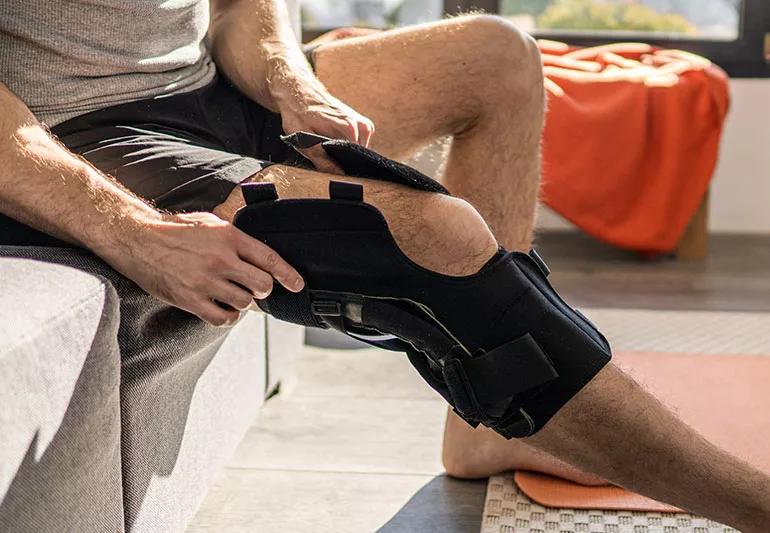Athletic trainer answers your brace-cleaning questions

If your provider has recommended a medical or sports brace for an injury, you might be wondering how often to clean it and how to take care of it.
Advertisement
Cleveland Clinic is a non-profit academic medical center. Advertising on our site helps support our mission. We do not endorse non-Cleveland Clinic products or services. Policy
Athletic trainer Brian Warner answers questions about how to maintain braces properly to keep them smelling fresh and looking clean.
A: Depending on what kind of brace you have, a medical or athletic brace can be rather costly. Maintaining and cleaning it will help extend its life.
Also, when you don’t clean braces regularly, they not only start to smell bad, but they also can sometimes cause health problems, such as folliculitis, ringworm and even staph infections.
A: Yes. Wearing a brace will increase your body temperature in that region, causing moisture to accumulate. Over time, this can cause skin deterioration. If you’re not being active, you should take the brace off to allow your skin and the brace to dry out.
Knowing which type of brace you have, and when it makes sense to wear it, is important. Not every brace needs to be worn all the time. Of course, you should always follow the recommendations of the healthcare professional who prescribed the brace to you. Contact your provider if you have questions about when you should or shouldn’t wear the brace.
A: It depends on the type of brace and the activities you engage in. For a simple sleeve or brace without metal components, it’s probably safe to launder every few days. For a larger brace (for example an ACL or OA brace) with a metal structure, wipe it down with a damp washcloth or baby wipe after each day.
Advertisement
Daily maintenance will prolong the life of the brace, as well as make the brace more comfortable to wear.
A: Most braces come with a set of cleaning instructions that you should follow. For most of them, a mild soap or laundry detergent and cold water will do the trick. Allow the brace to air-dry, or leave it out in the sun to freshen up.
For athletic braces that get heavy use, you can also spray lightly or wipe them with disinfectant and allow them to air-dry. Avoid storing braces in a gym bag or other area that does not get good ventilation and avoid putting the brace away dirty or damp.
A: A mixture of baking soda and a small amount of vinegar will keep the brace clean and help control odors. There are also great natural or plant-based cleaning products available that will do the trick.
A: It depends on what type of brace it is and how it’s designed. For example, exposed hinged braces may need to be lubricated. You should inspect the straps regularly for wear and tear. Some manufacturers also sell replacement parts.
A: If the straps or seams are tearing or if any rigid components are coming loose, it’s time to replace the brace if that component cannot be exchanged for a new part.
Another reason to replace your brace is if the fit has changed, either due to wear or changes in your body. An ill-fitting brace can create more problems than it helps. If the brace becomes too loose or too tight, consider getting a new one.
Advertisement

Sign up for our Health Essentials emails for expert guidance on nutrition, fitness, sleep, skin care and more.
Learn more about our editorial process.
Advertisement

It’s an emergency if the pain doesn’t go away, gets worse or you have other worrying symptoms

Your diet in the weeks, days and hours ahead of your race can power you to the finish line

Squats are foundational for building strength in your legs, glutes, quads and core muscles

It’s a great disinfectant for around your home, but not for your skin

A consistent walking program is an effective way to drop pounds and lose body fat

From playful movement to strength-building, kids need exercise to stay healthy and strong

Bathing once a day is the general guidance, but you could also have reasons to soap up twice a day or not at all

You can improve your athletic performance over time by breaking up your workout regimen into focused cycles

Even small moments of time outdoors can help reduce stress, boost mood and restore a sense of calm

A correct prescription helps your eyes see clearly — but as natural changes occur, you may need stronger or different eyeglasses

Both are medical emergencies, but they are very distinct events with different causes